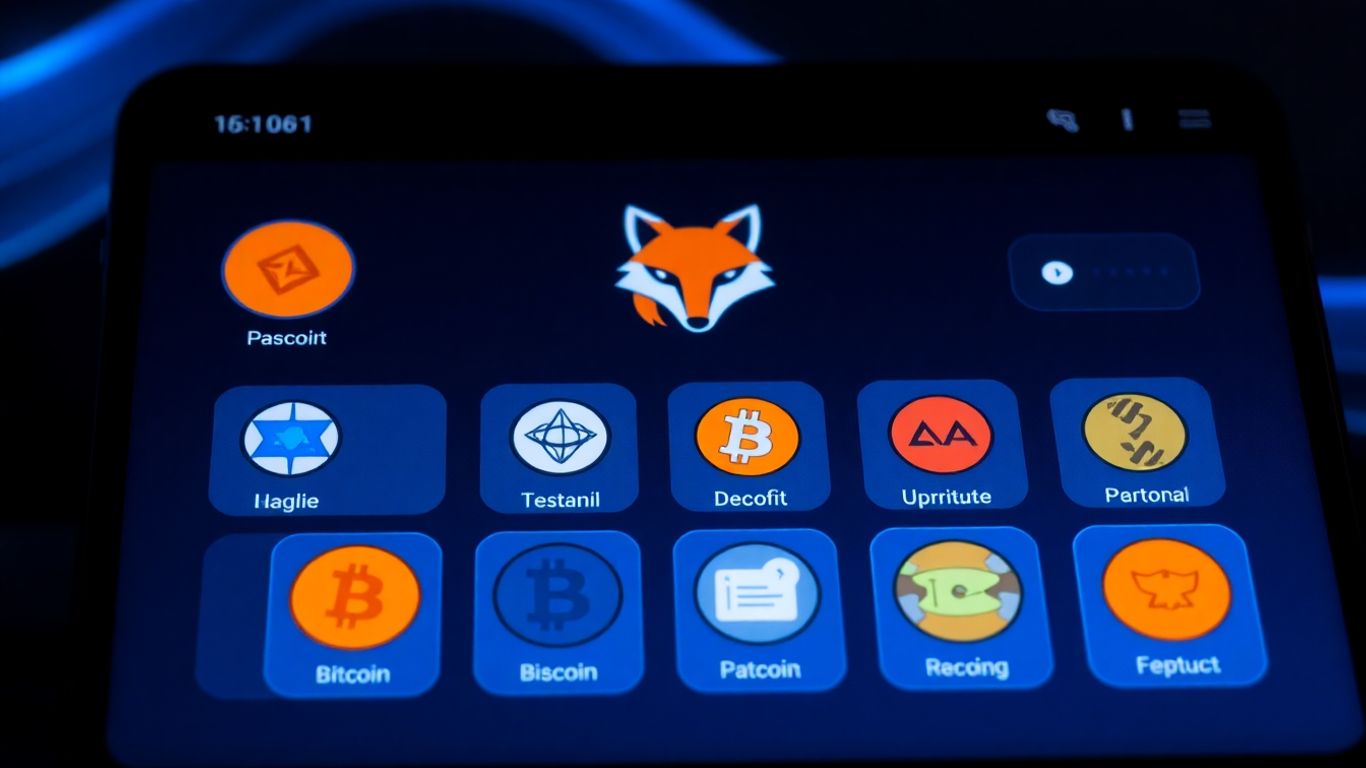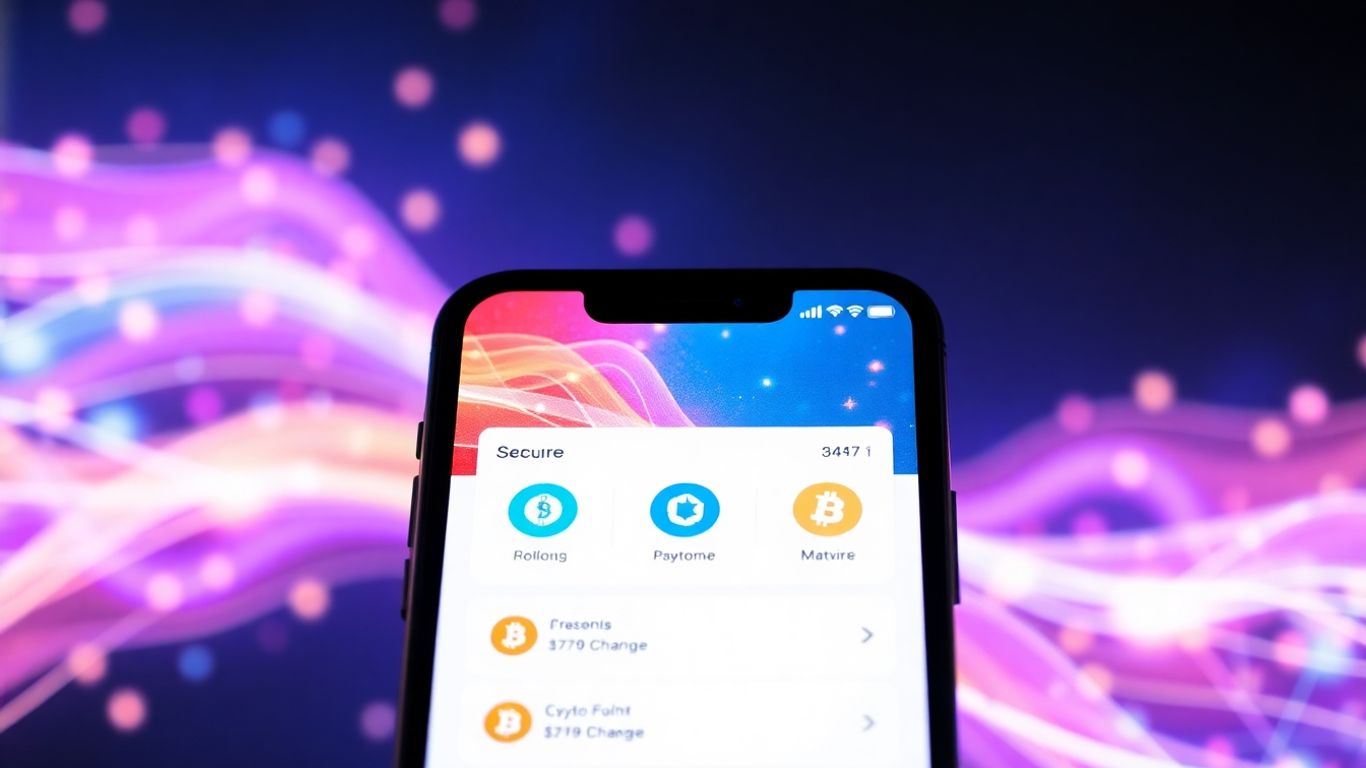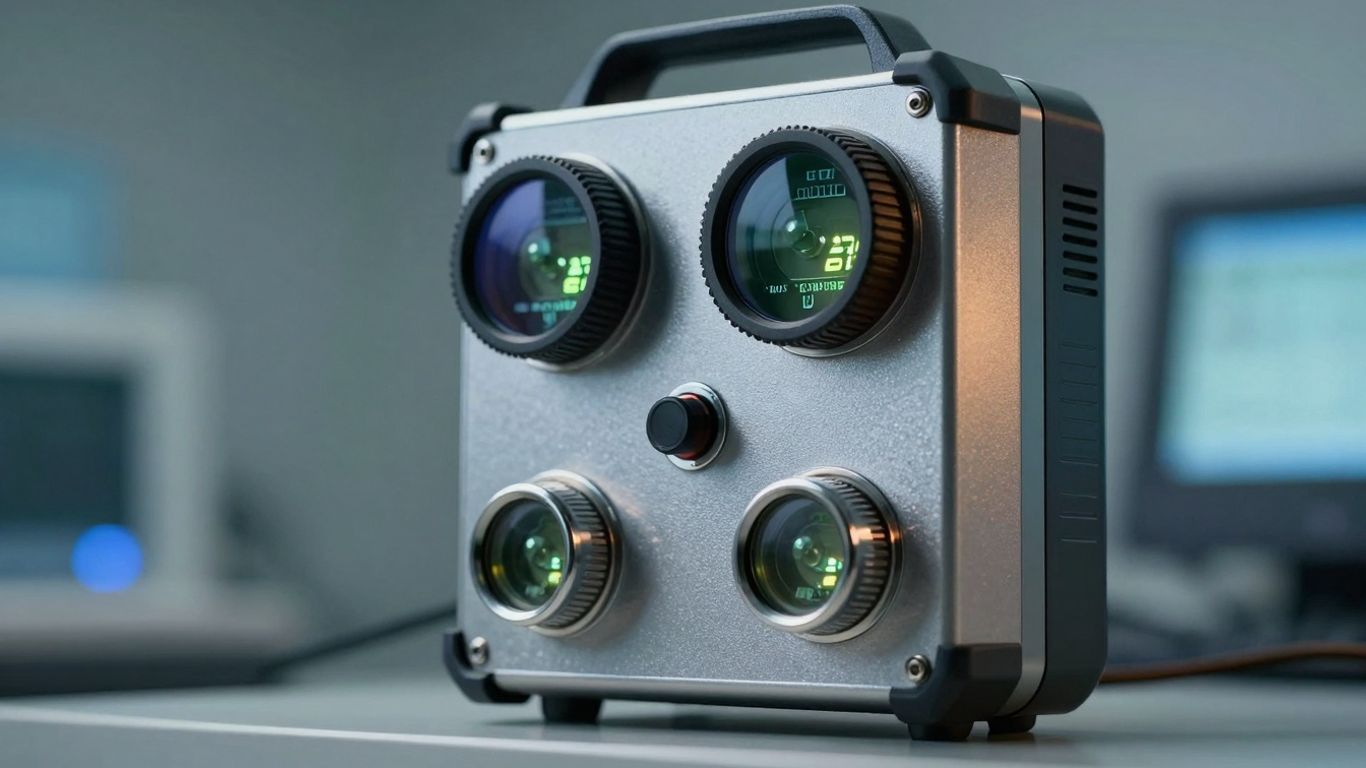[ newsletter ]
Stay ahead of Web3 threats—subscribe to our newsletter for the latest in blockchain security insights and updates.
Thank you! Your submission has been received!
Oops! Something went wrong. Please try again.
Discover Reddit's top picks for the best crypto wallet in 2025. Explore secure, user-friendly options for managing your digital assets. Find the best crypto wallet reddit 2025.





Finding the best crypto wallet reddit 2025 discussions often get pretty heated. Everyone's got their favorite, and what works for one person might not be ideal for another. It's a lot to sort through, right? We looked at what people are talking about and pulled together a list of top contenders. Whether you're just starting out or you've been in the crypto space for a while, this should give you a good starting point for choosing a wallet that fits your needs.
Exodus is a solid choice if you're looking to manage a bunch of different digital coins. It's pretty straightforward to use, which is a big plus, especially if you're not super deep into the crypto world yet. The wallet supports over 100 cryptocurrencies, so you're likely to find most of your holdings supported here. Plus, it has a built-in exchange feature, meaning you can swap one coin for another without leaving the app. That's pretty convenient.
Here's a quick look at what makes Exodus stand out:
It's available on pretty much every platform you can think of – Windows, Mac, Linux, iOS, and Android. This makes it easy to manage your assets from your computer or your phone. While it's generally well-regarded, some users have noted that you don't have much control over the exact transaction fees, and it doesn't have third-party audits, which might be a concern for some.
Exodus aims to make managing your digital assets less complicated. It balances a good range of features with an interface that doesn't feel overwhelming. It's a good middle-ground option for many people.
Overall, Exodus is a strong contender for anyone wanting a versatile and accessible crypto wallet. You can check out more about it on their official site.
Zengo really shakes things up in the crypto wallet world, and honestly, it's a pretty neat idea. Instead of those long, easily lost seed phrases, Zengo uses something called Multi-Party Computation, or MPC. Basically, it splits your private keys into different pieces, making it way harder for anyone to get to your funds. This keyless approach is a big deal for anyone who's ever worried about misplacing their recovery phrase. It's all managed through a mobile app, which is super convenient for everyday use.
What's cool is that Zengo isn't just about storing your crypto. You can actually buy, sell, and swap different coins right within the app. They also have features for staking, so you can earn a bit on your holdings. Plus, they've got these fiat on-ramp and off-ramp services, which makes moving money between your bank account and crypto much simpler. It's definitely geared towards mobile users who want a straightforward experience.
While it's great for mobile, you won't find a desktop version or browser extension here. Some users also mention that the fees for in-app exchanges can be a bit higher than on dedicated exchanges. Still, for a secure, user-friendly mobile wallet that simplifies crypto management, Zengo is definitely worth a look.
Zengo's focus on removing the complexity of seed phrases makes it a really accessible option for people new to crypto, or even those who just want a simpler way to manage their digital assets without constant worry about losing access.
Sparrow is a desktop wallet that really focuses on Bitcoin. If you're all about Bitcoin and want a lot of control over your transactions, this might be your jam. It's a lightweight option, meaning it doesn't hog your computer's resources, and it works on Windows, Mac, and Linux.
One of the cool things about Sparrow is how it lets you connect to different servers. You can choose to connect to public servers, private ones, or even run your own Bitcoin Core node for maximum privacy. This gives you a lot of flexibility in how you interact with the Bitcoin network.
Sparrow also has a neat transaction editor. Think of it like a super-powered blockchain explorer built right in. It helps you see all the details of your transactions and even lets you craft them with more precision. Plus, it supports the Lightning Network, which is pretty handy for faster, cheaper Bitcoin payments.
However, Sparrow isn't for someone just dipping their toes into crypto. You really need to have a decent grasp of how Bitcoin works. It also doesn't have built-in ways to buy crypto with regular money or swap between different coins directly within the wallet. You'll need other services for that.
Sparrow is best for experienced Bitcoin users who value control and privacy.
Here's a quick look at what it offers:
If you're looking for a wallet that gives you granular control over your Bitcoin transactions and offers robust privacy features, Sparrow is definitely worth a look. Just be prepared to do a bit of reading to get the most out of it.
BlueWallet is a solid choice if you're primarily focused on Bitcoin and want a mobile-first experience. It really shines with its user-friendly design, making it pretty straightforward to manage your digital assets, even if you're not super tech-savvy. What sets BlueWallet apart is its support for advanced features like Lightning Network transactions, which means faster and cheaper Bitcoin payments. It also offers multi-signature and watch-only wallet options, giving you more control over your security.
Here's a quick look at what it offers:
While it's great for Bitcoin enthusiasts, it's worth noting that its focus is quite specific. If you're looking to manage a wide array of different cryptocurrencies beyond Bitcoin, you might find other options more suitable. Also, some of the more technical features, while powerful, might have a bit of a learning curve for absolute beginners.
BlueWallet strikes a good balance between ease of use and advanced functionality, particularly for Bitcoin users who appreciate the flexibility of the Lightning Network and robust security options.
Trust Wallet has been around since 2017, and it's a solid choice, especially if you're primarily a mobile user. It was picked up by Binance a few years back, which gave it a nice boost. What really makes it stand out is how many different blockchains it supports – we're talking over 70. So, if you're dabbling in a lot of different crypto projects, this wallet can handle them.
It's pretty straightforward to use, which is a big plus. You can even swap tokens right within the app, and it has a built-in browser for checking out decentralized apps (dApps) and NFTs. This makes it super convenient for interacting with the wider crypto world without needing to switch between multiple apps.
While Trust Wallet is great for mobile users and offers broad blockchain support, it's worth noting that some users have reported occasional bugs. Also, if you're someone who needs direct customer support, you might find the options a bit limited here. It's a good all-rounder, but maybe not the first pick if you need extensive hand-holding.
It's a popular pick for a reason, offering a good balance of features and ease of use for everyday crypto management.

MetaMask has really become the go-to for anyone messing around with Ethereum and other EVM-compatible chains. It started out as a browser extension, which is still super handy for quickly interacting with all sorts of decentralized apps, or dApps as they're called. You can also get it as a mobile app, so it’s pretty accessible no matter how you like to manage your crypto.
It supports a bunch of different blockchains, not just Ethereum, but also things like Polygon, Avalanche, and Binance Smart Chain. This makes it pretty versatile if you're exploring different parts of the crypto world. The big draw for MetaMask is its seamless connection to the Web3 ecosystem.
Here’s a quick look at what it offers:
While MetaMask is super popular and generally considered secure, remember that its security really depends on how you manage your own private keys and seed phrase. It's a non-custodial wallet, meaning you're in charge, which is great, but also means you need to be careful.
It’s a solid choice for interacting with DeFi and NFTs, and you can find out more by reading our full MetaMask review.
The Trezor Model One is a bit of a legend in the crypto world. It was one of the very first hardware wallets out there, hitting the scene way back in 2014. Think of it as the OG of keeping your digital money safe offline. It’s not flashy, and it doesn’t have a fancy touchscreen, but that’s kind of the point. Its job is to be a secure vault for your private keys, and it does that job well.
What makes it stand out is its straightforward approach to security. You plug it into your computer, and when you want to send crypto, you confirm the transaction right there on the device. This physical confirmation step is a big deal because it means even if your computer gets hit with malware, your crypto is still protected. It uses a PIN code, and you can also set up a passphrase for an extra layer of security. Plus, the firmware is open-source, which means security experts can look at the code to find and fix any potential issues.
It’s also pretty affordable, especially when you compare it to some of the newer, more feature-packed hardware wallets. This makes it a really good starting point if you’re new to hardware wallets and want something reliable without breaking the bank.
While it might not support every single new coin that pops up, and it lacks some of the modern conveniences like wireless connections, the Trezor Model One remains a solid choice for anyone prioritizing security and simplicity for their Bitcoin and other major cryptocurrencies.
Ledger has been a big name in hardware wallets for a while, and the Nano Flex is their latest attempt to blend security with a more modern feel. It's got a decent-sized touchscreen, which makes interacting with your crypto a bit easier than some of the older button-only models. Plus, it packs in NFC, which is a nice touch for connecting to other devices without always needing a cable.
The Nano Flex aims to be a user-friendly option for those who want solid hardware security without too much fuss.
When you're looking at hardware wallets, a few things really stand out:
While the Nano Flex is a step forward for Ledger, it's still a relatively new product. Like any tech, especially in the crypto space, it's worth keeping an eye on how it performs and if any new issues pop up over time. The added connectivity, while convenient, can sometimes introduce new security considerations compared to completely air-gapped devices.
It's a solid choice if you're looking for a hardware wallet that's a bit more modern and easier to use than some of the older models, especially if you value that touchscreen and NFC capability. Just remember that to get the most out of it, you'll likely be using the Ledger Live app, which is Ledger's own software.

Coinbase Wallet is a pretty interesting option, especially if you're already in the Coinbase ecosystem. It's not just a place to stash your crypto; they've really tried to make it an all-in-one spot. Think managing your coins and NFTs, but also dipping into a creative economy where you can actually get rewarded for your content. It's a mix of the usual wallet stuff with social app vibes, which might be cool for people who want their finance and social life to overlap a bit.
The app supports a bunch of different blockchains, including Bitcoin, Ethereum, and Solana, so you can keep a lot of different coins and collectibles in one place. They've also built in features for buying, swapping, and staking, which means you don't always need to go to a separate site. Plus, they're using passkeys for backups, which is a more modern way to recover your wallet if something happens. They even have smart wallet tech that can cover transaction fees sometimes, which is a neat perk.
It's worth noting that Coinbase Wallet has a pretty good reputation, with the mobile app getting a 4.6/5 rating on the iOS App Store. This makes it a solid choice for many users looking for a reliable place to store their digital assets.
While the integration with the broader Coinbase platform is a plus for many, some users might find the social features a bit much if they're just looking for a straightforward, private wallet. Also, the transition to the new Base app format might take some getting used to for long-time Coinbase Wallet users.
Tangem is a pretty interesting option if you're looking for something different. It's a hardware wallet, but instead of a clunky device, it uses these small, credit card-like smart cards that connect to your phone via NFC. This makes it super simple to use, almost like tapping your card to pay for something. No more worrying about losing a seed phrase or typing in a long string of words. You just tap the card to your phone, and you're good to go.
It supports a lot of different cryptocurrencies, over 80 networks actually, so you can keep a bunch of different coins on one card. The app is available for both iOS and Android, which is handy. They've also put a lot of effort into security, using certified secure elements and a design that doesn't allow firmware updates, which is a smart move to prevent certain kinds of attacks. It's also built to be tough, resistant to things like dust, water, and even X-rays.
One thing to keep in mind is that it relies entirely on your smartphone's NFC capabilities. If your phone doesn't have NFC, or if you're not a fan of using your phone for everything, this might not be the best fit. There isn't a desktop version of the app either, so it's strictly a mobile experience.
Here's a quick look at what it offers:
Overall, if you value ease of use and a modern approach to hardware security, Tangem is definitely worth checking out. You can find more details on their official website.
So, we've looked at some of the top crypto wallets out there for 2025, covering everything from super-secure hardware options to handy mobile apps. Picking the right one really comes down to what you need – are you storing a lot of crypto long-term, or do you plan on making frequent trades? Security is always the big one, no matter what. Make sure your chosen wallet keeps your private keys safe and offers features like two-factor authentication. Don't forget to think about how easy it is to use and if it supports all the different coins and tokens you're interested in. Take your time, do a little more digging if you need to, and you'll find a wallet that works well for you.
When picking a crypto wallet, the most crucial thing is security. Think about features like needing your fingerprint or face to open it, keeping your secret codes safe, and making sure your information is scrambled and private. It's like choosing a super strong lock for your digital money.
A 'hot wallet' is connected to the internet, making it easy to use for quick buys and sells, but it's more open to online threats. A 'cold wallet' is kept offline, like a special USB drive, which is much safer for storing your crypto for a long time, but it's a bit slower to access.
Many wallets let you hold different kinds of digital money, like Bitcoin and Ethereum, all in one place. This is called multi-chain support, and it's super handy if you have a variety of digital coins you want to manage easily without switching between different apps.
Yes, wallets where you keep control of your own secret codes (called non-custodial wallets) are generally seen as safer. This means if the company that made the wallet has a problem, your money is still safe because only you have the keys to access it.
A good wallet should feel simple and easy to understand, even if you're new to crypto. Look for wallets with clear instructions, easy ways to send and receive money, and maybe even helpful guides or videos to teach you how things work. It shouldn't feel like rocket science!
A seed phrase is like a master key for your crypto wallet, usually a list of 12 or 24 random words. If you lose access to your wallet or get a new device, you can use this phrase to get all your crypto back. It's super important to write it down and keep it somewhere extremely safe and private, like you would with a treasure map!


